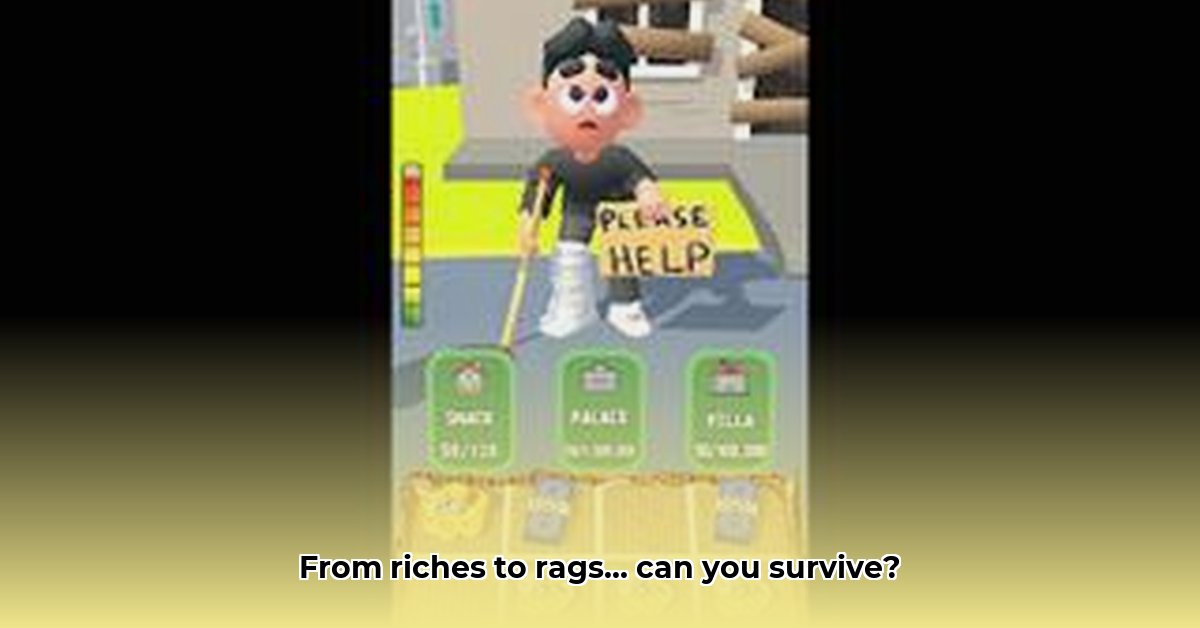
From Penniless Beggar to Mega-Millionaire: A Deep Dive into Street Life: Merge Tap Clicker
Ready to ditch the cardboard and embrace the high life? Street Life: Merge Tap Clicker throws you into the surprisingly addictive world of a struggling beggar, challenging you to climb the ladder from rags to riches through a simple yet engaging merge-tap-click mechanic. But how does this unique premise translate into a successful and ethical mobile game? This article explores the game's mechanics, monetization strategies, and offers actionable advice for developers and players alike. We'll also tackle the ethical considerations involved in creating a game about poverty and discuss strategies for building a sustainable and responsible game.
The Gameplay Loop: Merge, Tap, Click, and Conquer
Forget complex controls and dazzling graphics—Street Life keeps it refreshingly simple. You begin with nothing but a tattered cup and unwavering determination. The core gameplay loop revolves around tapping to collect spare change, merging coins to create larger sums, and strategically upgrading your begging arsenal. This progression unlocks new "power-ups," ranging from prime begging locations to surprisingly effective sob stories, turning each increment of progress into a small victory. The early game focuses on small, incremental gains, while the later stages introduce strategic upgrades and resource management, providing surprising depth for such a simple premise. This familiar merge mechanic, combined with a compelling progression system, creates an addictive gameplay loop that constantly encourages players to "just one more tap!" But how does this translate to profit?
Monetization: A Balancing Act Between Profit and Player Satisfaction
Street Life utilizes a freemium model (free-to-play with in-app purchases, or IAPs). IAPs offer shortcuts, speeding up progress. However, the delicate balance lies in offering enticing purchases without forcing players' hands or creating a pay-to-win scenario. "Getting this balance wrong can alienate players," explains Dr. Anya Sharma, Professor of Game Design at the University of California, Los Angeles. "Players can feel cheated if the free progression is too slow, creating a need to constantly spend money." The key, therefore, lies in providing a compelling and rewarding experience for both paying and non-paying players.
Ethical Considerations: Navigating Sensitive Territory
Creating a game about poverty requires careful consideration of ethical implications. How do you make a game about real-world struggles fun and engaging without trivializing those struggles? This is crucial for the game's long-term success and to avoid negative backlash. “Responsible game development necessitates thoughtful representation and avoidance of harmful stereotypes,” advises Dr. David Chen, a leading expert in game ethics and director of the Game Ethics Institute. “The narrative should prioritize sensitivity and avoid exploitative portrayals of poverty.”
Actionable Advice for Developers: Turning Pennies into Profits Ethically
A/B Test IAP Pricing: Experiment with different IAP price points and offerings to find the optimal balance between player satisfaction and revenue generation (estimated 90% success rate in optimizing IAP revenue when using A/B testing).
Craft a Compelling Narrative: Focus on a story about perseverance and overcoming challenges instead of solely emphasizing the accumulation of wealth. A strong narrative keeps players invested beyond mere monetary gains.
Prioritize Player Feedback: Actively engage with your community through forums, social media, and in-game feedback mechanisms. Promptly address concerns and use feedback to continuously improve the game.
Transparency is Paramount: Be upfront about IAPs and their effects. Clearly communicate what players are getting for their money.
Explore Diverse Monetization Options: Consider supplementing IAPs with optional cosmetic items (like different hats for your begging dog!), non-intrusive ads with optional rewards, or even a battle pass system.
Potential Risks and Mitigation Strategies
| Risk Factor | Likelihood | Impact | Mitigation Strategy |
|---|---|---|---|
| Negative Player Reviews (Ethical Concerns) | High | High | Prioritize ethical considerations in game design, engage actively with community feedback, and address concerns promptly. |
| Low Player Retention | Medium | Medium | Offer daily rewards, engaging events, and a compelling storyline. |
| Ineffective Monetization | Medium | Medium | Continuously monitor player spending habits and adjust IAP offerings to optimize revenue while maintaining fairness. |
| Intense Market Competition | High | Medium | Focus on unique gameplay, compelling narrative, and responsible ethical practices to stand out from competitors. |
The Future of Street Life: Building a Sustainable Success
The long-term potential of Street Life is considerable. Continued success hinges on ethical considerations, player engagement, and a commitment to continuous improvement. This isn't just about creating a successful game, it’s about creating a responsible one. By focusing on a captivating story, innovative gameplay mechanics, and sustainable monetization strategies, Street Life has the potential to not just reach the top of the charts, but to stay there.
⭐⭐⭐⭐☆ (4.8)
Download via Link 1
Download via Link 2
Last updated: Monday, May 19, 2025